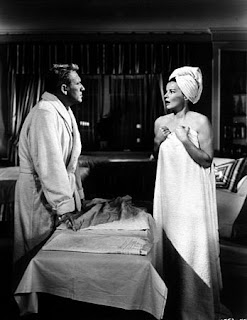Wise: Hello, Werth. Still basking in the glow of our weekend movie marathon?
Werth: Yes, and my cranberry sparkly cocktail.
Wise: It was great fun to watch the American Masters documentary On Cukor (2000) as well as one of his masterworks, The Philadelphia Story starring his frequent collaborator and longtime friend Katharine Hepburn. Based on the Broadway smash by Philip Barry, the film opens with one of the most recognizable (and funny) scenes in all of screwball comedy.
Werth: Don't forget the drunken shenanigans!
Wise: After rapidly ascending the Hollywood ladder in the mid-30's, Hepburn's star had been somewhat tarnished by a series of misfires and flops at the end of the decade, prompting theater owners to label her "box office poison." Hepburn retreated to the stage, found a hit in Barry's play, and with the help of then-sweetheart Howard Hughes, she purchased the film rights and brought the project back to MGM where she insisted that Cukor direct.
It turns out to have been a savvy decision because his guidance helped her forge a performance that embraced both her somewhat prickly image as well as her more tender, romantic side.
Werth: Not to mention directing Stewart to his only competitive Oscar win.
Wise: The rest of the cast is uniformly excellent. Grant deploys all his usual charms, although he mutes his performance with a tinge of sadness, marking him as a heel who has seen the error of his ways. Stewart also shows unsuspected facets of his personality, leavening his everyman quality with a romantic passion that makes him alluring to Tracy. Cukor's hand is everywhere evident in the finished film, coaxing greater nuance from his actors and allowing the camera to linger on their faces, bringing the film's drama and humor into greater focus.
Crawford credited Cukor with helping her give more depth to her roles, and the Cukor Effect is on full display in their 1941 collaboration, A Woman's Face. A re-make of a 1938 Swedish film that helped launched Ingrid Bergman's career, A Woman's Face begins in a Swedish courtroom where Anna Holm (Crawford) is on trial for murder.
Wise: Sounds like Mildred Pierce meets the Swedish Chef.
Werth: Witness testimonies kickstart the flashback where Anna meets spendy playboy Torsten Barring (Conrad Veidt) as he struggles to pay his check at her restaurant, a Hansel and Gretel-esque setting with Anna as the waiting witch. We also see a fantastic makeup job as shadows and Anna's turned head are undone and we discover that half of her face is horribly disfigured.
Wise: I guess absconding with sopranos to the basement of the Paris Opera House was out of the question.
Werth: During a blackmail touch gone wrong, Anna meets plastic surgeon Dr.Gustaf Segert (Melvyn Douglas) who decides to re-make Anna's face. Like a Pygmalion of the soul, Dr. Segert hopes that by restoring the beauty to Anna's face, he can restore the beauty to her conscience. But Anna is now torn between two men and herself. Crawford often played tough cookies who were bad because they'd been made that way. But in no other film is this theme given such graphic visual expression.
Wise: If only Faye Dunaway had been half as successful in removing her horrifyingly deformed mask.
Wise: We'll have to watch that one on our next Cukor Festival.
Werth: I'll get the cocktails ready. Film Gabbers, what director-focused film festival would you like to gab about?


















































